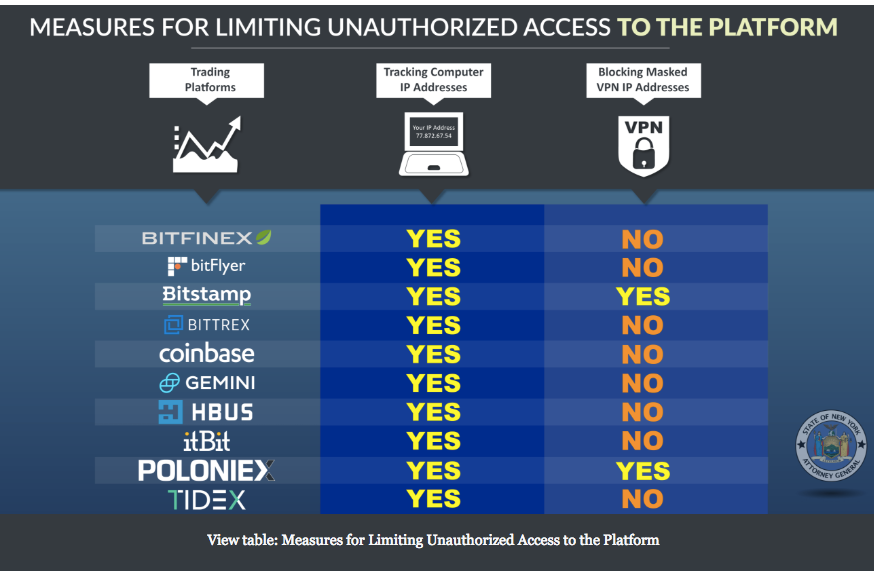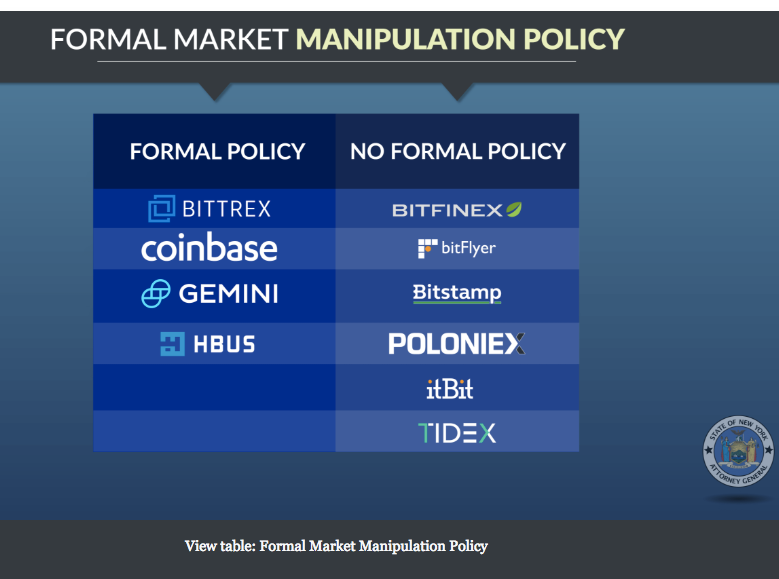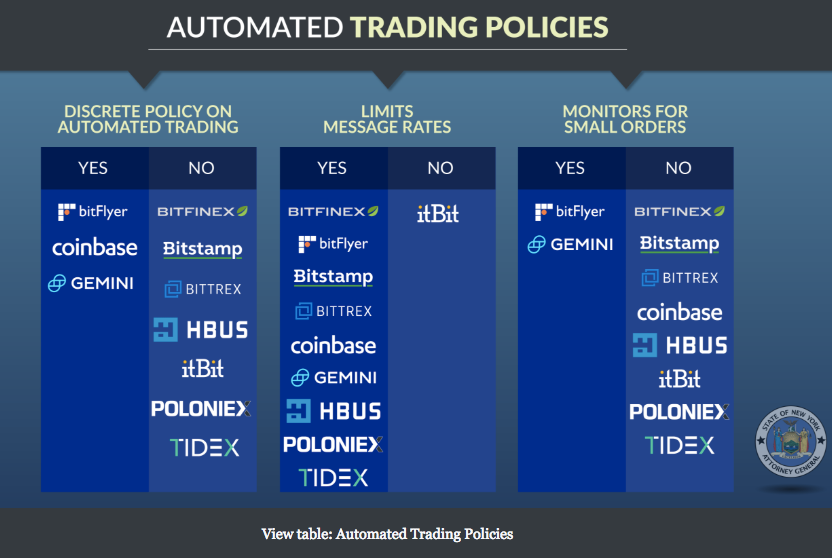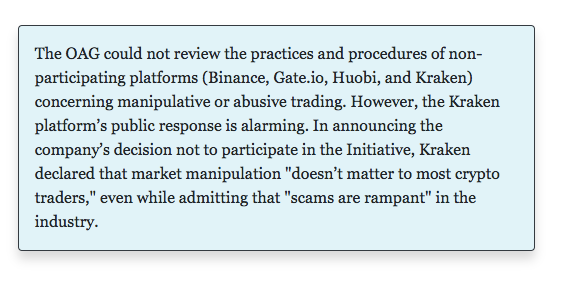About the NYAG's crypto report - Messari's Unqualified Opinions
Coming soon to a jurisdiction near you...
Messari’s Unqualified Opinions Issue #2
TLDR:
The NYAG report on crypto trading platforms is the most comprehensive investigation released to date by a regulator. It contains a wealth of information. But to understand it, you need some context. How did the NYAG’s office obtain their information? What are the report’s implications? And what corner of the regulatory space did the NYAG pop out from to investigate crypto exchanges in the first place?!
The New York Attorney General’s Crypto Report: a crash course in more dated & esoteric laws
Yesterday, the New York Attorney General’s Office (NYAG) released a massive 42-page report that outlined the findings of their investigation into crypto exchanges.
Where (and how) did the NYAG get this information?
As part of the "Virtual Markets Integrity Initiative”, the NYAG office sent questionnaires to 13 crypto exchange platforms back in April, presumably to get better information on the practices and procedures of these exchanges.
The NYAG’s full letter and questionnaire can be found here, but they basically ask the target exchanges to provide details on how they deal with:
Ownership & control
Basic operation and fees
Trading policies and procedures
Outages and other suspensions of trading
Internal controls
Money laundering surveillance
Protection against customer fraud
Etc.
Most exchanges “invited to participate” immediately voiced their intention to cooperate with the NYAG, but several notable exchanges declined, including Binance, Huobi, and Kraken.
Kraken was the most vocal to decline, and included a very public and angry statement from CEO Jesse Powell that argued (among other things) that “the placative kowtowing toward this kind of abuse [the out-of-left-field questionnaire] sends the message that it's ok. It's not ok. It's insulting.”
Roger that.
Powell might not have been entirely wrong to vent. Kraken (headquartered in California) left New York State in 2015, in response to the New York’s proposed “BitLicense”. And the amount of money crypto exchanges spend on legal and compliance costs is staggering.
A review of the history and implications of the BitLicense could make for an entirely new post (throwback to TBI’s initial critical take in 2014), but in short the BitLicense required any business that conducted business ‘involving virtual currency’ to be licensed by the New York Department of Financial Services (NYDFS). Something many felt was redundant and overly burdensome compared to federal regulations.
Still, without the BitLicense, crypto businesses could not operate within the NYS borders or serve its residents. The BitLicense’s impact has been far-reaching, and still impacts the city’s startup scene today.
To date, NYDFS has granted just nine BitLicenses, while the former Superintendent has long since moved on.
[TBI Note: “moved on” to the revolving door of “consulting” on the very regulations his office helped institute.]
Back up, though. That’s NYDFS. Why did New York AG’s office get involved?! And why are they so aggressive?
Ah yes. Just when you thought the whole federal gauntlet of SEC/ CFTC/FINRA/FinCEN/OFAC/CFPB/OCC/DOJ/IRS wasn’t headache enough, and 50 state regulators were quite enough to deal with, now we’ve got a state Attorney General jumping into the fray as well!
To understand why, it’s time for a quick crash course in U.S. law.
Each state has jurisdiction (aka “power”) over the activities and the people within its state. That means unique laws/rules/regs across 50 states. BUT, once this thing/person/activity spills over state borders, federal law comes into play.
The intricacies of state/federal laws could cover a semester of law school, but for this particular report, here’s what you need to know: state regulators and agencies can (and do) regulate crypto activity that happens within their borders.
While this isn’t unique to New York, the state does present a particularly special case because of this little thing called the Martin Act (originally passed 97 years ago - I kid you not). The Martin Act gave the New York State Attorney General really broad powers (both civil and criminal enforcement abilities) over anything and everything that could be considered detrimental to the investing public (e.g securities fraud). The Martin Act did not establish a state regulatory agency, but instead gave the Attorney General sole responsibility for its implementation and enforcement.
If that sounds scary, it’s because it is.
The NYAG is empowered under the Martin Act to — among other things— launch investigations, criminal prosecutions, civil proceedings, and issue subpoenas that "require production of documents deemed relevant or material to an investigation” as it relates to possible securities fraud cases. This means that the act of sending out questionnaires and launching investigations into crypto exchanges was indeed within the NYAG’s power.
Ok, so what does the report actually say?
There’s a ton to unpack. Personally, I was kinda impressed that AG Underwood released the report on twitter via tweetstorm, summarizing some of the key points.
Underwood’s voiced three primary concerns:
1) Many platforms had yet to implement serious efforts to prevent or even monitor abusive trading. (For example, few platforms seriously restrict or monitor the operation of bots or automated algorithmic trading on their venues.)
2) Exchanges have myriad conflicts of interest. Some charge listing fees, others allow for employee trading or even prop trading by internal teams, etc. (We learned for instance that for Coinbase, “20 percent of executed volume on its platform was attributable to its own trading”!!!)
3) Customers have limited protection of their funds. If a hack or unauthorized withdrawal occurs, customers would be highly exposed. (Secure third-party custody remains an unsolved problem in crypto…some would say “feature, not a bug.”)
The NYAG’s report has some nice infographics (especially for a government’s investigative report). Here are some of the more interesting ones:

Understand Jesse’s frustration, now?


What’s striking is how many entities with BitLicences seem to be on the wrong side of these charts! Gemini and Coinbase hold up pretty well, but neither block masked VPN IP addresses. Meanwhile, itBit, Poloniex, and bitFlyer don’t have formal market manipulation policies. It begs the question, what was the point of the BitLicense?
What does all of this mean?
Crypto twitter is abound with snarky chatter and summaries of the report, and no one in the industry seems particularly surprised by the findings (crazy listing fees? conflicts of interest? little to no employee trading policy? lol whhhhhhat, no way, that’s so crazy </sarcasm>!)
Still, you should expect some of the findings and statistics in this report to be cited in future regulatory actions. Coming soon to a jurisdiction near you.™
What could those actions look like?
This goes back to the Martin Act where neither scienter (legal jargon for intent to defraud) nor reasonable reliance (legal jargon for when a customer behaves a certain way based on a vendor’s representations) needs to be proven in order for the NYAG to prove violation of the Act.
That’s right! The NYAG has the ability to investigate and both civilly and criminally charge someone/ some business for securities fraud WITHOUT having to prove that there was an actual intention to defraud or that actual damages or reliance occurred.
If crypto exchanges are found to have violated the Martin Act, the NYAG could obtain a permanent injunction (aka stop you from operating in the state), as well as impose fines pending a deeper investigation. Criminal charges are also technically possible, if unlikely at first glance.
The NYAG with Martin Act powers makes the SEC look **friendly**. At least the SEC has to actually prove a number of important elements, and even then stay in its lane of civil punishments only.
Turns out New York is Samara and the SEC is more like Casper.
[TBI note: this is a fantastic, esoteric “The Ring” reference. My hair stands on end the same way whenever I hear “Samara” or “New York Crypto Regulation.”]
What does this mean for the three exchanges (Binance, Gate.io and Kraken) referred to the NYDFS for potential BitLicense violations?
I don’t know. New Yorkers are aggressive. New York is aggressive. There even is a special and extra sassy (my favorite adjective do not @ me) shoutout to Kraken for Jesse’s public refusal to participate in the investigation:

Either way, the warning comes with a big stick to back it up.
The glass half full take? Cooperation could lead to better crypto exchange practices, provided regulators give them the latitude to do so over a reasonable amount of time.
Glass half empty? Regulators gonna continue to regulate.
- Katherine @ Messari
P.S. If you have made it this far and your brain hasn’t melted from legalese, you are the real MVP. Tweet at me or Messari for feedback, comments, or (more?) questions.
News & Analyses
Messari Compression Algorithm
Content and thoughts from around the web as summarized by the Messari team.
🎭 [Analysis] Complexity Theater - Nathaniel Whittemore
Complexity theater, where the presentation of ideas is complicated to make those ideas seem more valid, has wreaked a particular havoc on the crypto space according to Nathaniel Whittemore. But it doesn't have to be this way. Whitepapers have become the de facto way to announce a project, which makes sense…sometimes. Blockchain networks are technical, and detailing the way they work is important for future users. But complexity becomes a problem when projects use the natural complexity of “blockchain” to dupe investors by introducing technical references as a marketing tool. Projects that focus on complexity 'shock and awe' are guilty of this. Others that can find ways to simply describe the problem they address and the technology they will use do well to avoid complexity theater. (Messari | Source)
🔌 [Analysis] Electric Money - LaurentMT
LaurentMT asks, is Bitcoin's proof-of-work (PoW) worth the cost? At first sight, alternative models like centralized and federated validation, offer more efficiency. But they allow incumbents to maintain their dominant position and preserve their ability to enforce arbitrary decisions. Proof-of-stake (PoS) or delegated proof-of-stake (DPoS) are touted as viable alternatives to PoW but they too protect incumbents and restrict competition. PoW is imperfect, but it’s an open, competitive system, where success depends on physical, financial, and technological resources. Efficiency isn't an absolute metric in crypto and gains from alternative systems remove the protections that PoW offers, making it the most 'efficient' solution we have. (Messari | Source)
Quick Bits (Don't read that, I read it for you)
Choke Points (Exchange News)
💱 Coinbase has added a new head of analytics and data science. Michael Li, who was previously a senior exec at LinkedIn will be joining the team full time. (Messari | Source)
📇 Poloniex will delist eight tokens- BTCD, BTM, EMC2, GRC, NEOS, POT, VRC, XBC. (Messari | Source)
⛲ Binance to offer fiat trading in Singapore. The exchange will be open to beta customer prior to a full rollout. (Messari | Source)
💱 Bancor expanding to EOS. The new cross-chain product, called BancorX, will allow users to trade between select EOS-based tokens, which have yet to be specified, as well as Ethereum based tokens. (Messari | Source)
Startup Signals (ICOs, Cryptos, and Startups)
🚂 Steemit is back online after a nine-hour outage on Monday. Steem representatives clarified that while the reason for the issue was unknown they were not related to a recent fork and claimed there were no issues with lost funds. (Messari | Source)
🗼 Crypto fund BlockTower announces New York office and new hires. The firm, which is based in Stamford, Connecticut, expanded its team from eight employees to 13 as it added a new office in New York. (Messari | Source)
🌍 Cloudflare launches IPFS gateway. The platform, which allows users to access IPFS without installing any special software, will be the first product in a new distributed web gateway project. (Messari | Source)
The Powers That Be (Legal/Reg/Policy)
⛔️ China's central bank, the People's Bank of China (PBoC), has issued a public notice warning investors of the risks related to cryptocurrency trading and ICOs. (Messari | Source)
❌ Two Korean exchanges suspend unverified crypto withdrawals. Bithumb, the largest crypto exchange by trading volume in South Korea, and Coinone, the third largest by the same measure, announced similar bans on unverified accounts during the past week. (Messari | Source)
Did I miss something?
Send me the link, your twitter handle and your best imitation compression algorithm write up. If I like it, I’ll include your bit next issue (with attribution).
Community Updates
Announcements
🎧 ICYMI, we also host & produce our own podcasts on Spotify and iTunes. In last week’s episode, Ryan Selkis (CEO of Messari) and Qiao Wang (Head of Product, Messari) share their experiences from the previous week at EthBerlin. Listen on Apple Podcasts here, Spotify here, or Soundcloud here.
Our next podcast episode will feature our favorite CT lawyer, Jake. Comes out on Thursdays, so make sure you don’t miss it! More regulatory fun heading your way 👩🏻⚖️
Shameless Plugs
We're Hiring:
We need data engineers who want to bring transparency to crypto!
Join a fast growing team in NYC; work with crypto OGs, and former Bloomberg/Palantir engineers; & access a network that sets you up for the rest of your career. Apply here!
Upcoming Travel:
Hit us up in these locations:
Crypto Springs, Palm Springs, October 3 & 4
EthSF, San Francisco, October 5-8th
DevCon, Prague, Czech Republic October 30–November 2, 2018
Join Our Community:
If you are interested in helping us crowdsource token project details, or want to join our community to share your expertise, wed love to have you on board! Take a second to fill out an application and we will get back to you soon.
Going forward, we’ll be capping new members at 15 each week to keep things running smoothly. If you haven’t heard back, you are probably in the queue.
Like what you read? Share it! Hate what you read? Let me know @MessariCrypto.



